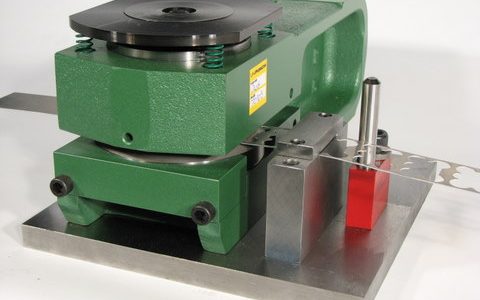Transforming Strip Metal into Precise Blanks
Transforming Strip Metal into Precise Blanks
Looking to punch blanks quickly and efficiently? UniPunch has the solution you need. Our custom metal blanking tooling streamlines your production process with accuracy and speed.
Effortless Metal Blanking
Metal blanking involves cutting flat sheets or strips of metal into precise shapes or blanks for further fabrication. UniPunch’s easy to use system makes this process effortless and reliable.
How UniPunch Transforms Sheet Metal into Precise Blanks
- Setup: Position the dowel pin stops in the reamed holes on your template. Place the UniPunch unit(s) in the designated holes with the pilot pins in the bottom of the c-frame.
- Positioning: Align your sheet metal strip against the dowel pin stops to ensure proper positioning before punching.
- Punching: With the setup complete, you’re ready to blank parts. UniPunch tooling allows you to punch multiple blanks in a single stroke, producing precise parts efficiently.
- Inspection: Inspect the blanks to ensure they meet your specifications. UniPunch recommends checking hold-down bolts frequently during part runs to maintain accuracy.
Get Started with UniPunch
Let UniPunch help you optimize your manufacturing process. Contact us today with your part drawing, and our team will recommend the best tooling solution for your needs.
Maintaining Peak Performance in Tooling Systems
Maintaining your UniPunch tooling is important for peak performance and longevity. Proper maintenance not only extends the life of your tooling but also ensures that your manufacturing processes remain efficient and cost-effective.
The Importance of Regular Maintenance
Regular maintenance is essential for keeping your tooling systems in top condition. Here are a few key practices to incorporate:
- Sharpen Punches and Dies Regularly: Regular sharpening of punches and dies reduces wear and tear on your press or press brake. Sharp tools require less force to punch through material, which reduces the required tonnage.
- Lubricate Internal Components: To prevent wear, it’s important to lubricate the internal components of your tooling. This should be done both during routine maintenance and at intervals during punching operations.
- Replace Worn Components: Over time, components such as springs and retainers can wear out. Replacing these components as needed helps maintain the efficiency and accuracy of your UniPunch.
- Follow Manufacturer’s Guidelines: Always refer to the UniPunch parts book for detailed guidelines and instructions specific to your tooling systems.
Subscribe to our YouTube channel for more tooling tips and watch our latest video on tooling maintenance!


